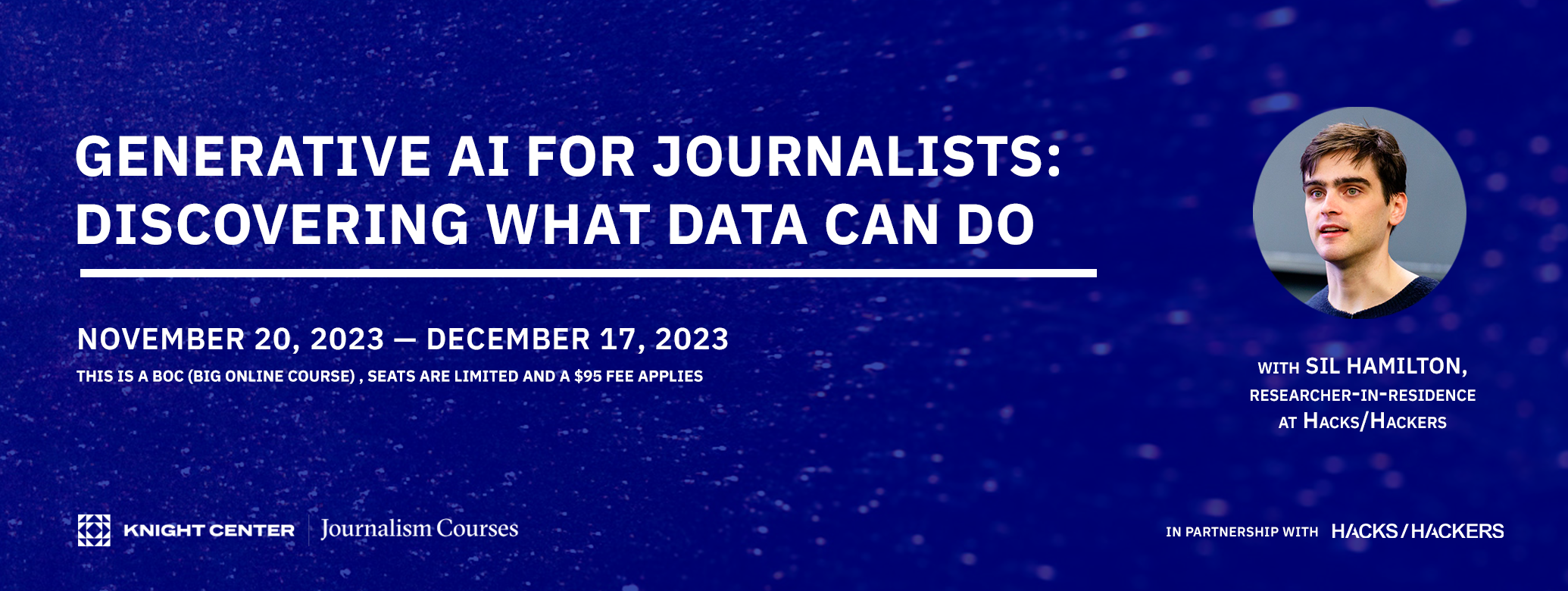Learn how to develop and implement your own generative AI workflows during a new online course from the Knight Center for Journalism in the Americas in partnership with Hacks/Hackers.
“Generative AI for journalists: Discovering what data can do” runs from Nov. 20 to Dec. 17, 2023. Registration is open now for this paid course, with limited spots available! Register now to secure your participation.

This course will equip you with the skills and knowledge necessary for navigating the next generation of computing. It will introduce you to the machine learning domain by building up specific skills week by week, leaving you prepared for the generative AI applications and workflows only now entering newsrooms.
“It’s one thing to talk about generative AI, and it’s another thing to use it,” said course instructor Sil Hamilton, a machine learning engineer and AI researcher-in-residence at Hacks/Hackers. “Technologies like language models have hit the mainstream over the last year. Hot takes are a-plenty, but clear instructions on how to make use of the models to unlock their potential for yourself are fewer.”
This course will build on the success of the Knight Center’s recent massive open online course (MOOC) "How to Use ChatGPT and Other Generative AI Tools in Your Newsroom," which attracted more than 8,000 participants from 157 countries.
“‘How to Use ChatGPT and Other Generative AI Tools in Your Newsrooms’ was very general—what is it, and what sorts of generative AI products for newsrooms are in the market today. It was intended to help with policymakers and journalists wanting an introduction to the topic,” said Hamilton, who co-taught the MOOC with Aimee Rinehart of the Associated Press. “Exploring AI is rewarding, and helps you get a better sense of what potential there actually is right now. So, the previous course addressed the what; we’ll be addressing the how.”
Unlike the MOOC, which offered more general content and was open to thousands of participants, this new course is more advanced and limited to a few hundred students, which allows more time for interaction with the instructor.
To facilitate this, the course will host live office hours with Hamilton, and all live sessions and office hours will be recorded to ensure that those who are unable to attend can access them at a later date.
This course costs $95, including full access to course materials and a certificate of completion for those who meet the course requirements.
“Generative AI for journalists: Discovering what data can do” is designed for journalists who recognize the potential of generative AI but may not have extensive technical backgrounds. No coding experience is required, and the course content is structured to accommodate learners of all levels. Whether you're looking to strengthen your data journalism skills or prepare for the next wave of computing, this course is for you.
As an asynchronous course, you have the freedom to learn at your own pace while still having recommended weekly deadlines. Dive into the modules and activities when it's most convenient for you. Engage in discussions, complete quizzes, and gain practical experience without being tied to rigid schedules.
“Everyone learns at their own pace,” Hamilton said. “There will be plenty of notebooks, code examples, datasets, and videos to help you make your way through the basics of using text and image models on your personal computer. The course is composed into stages—beginner, intermediate, and so on—and working through the material at your own pace will let you get the most out of the course. You will have me available at every step in case of questions or concerns, and there will be plenty of instructions and examples to get you motivated along the way.”
The course leverages industry-standard tools like JupyterLab Desktop and Hugging Face, ensuring that you have the best resources during your learning experience. Hands-on tutorials will guide you through setting up your computing environment, making the learning process easy and seamless.
The material is organized into four modules. Each module will cover a different topic through videos lectures and guest interviews, presentations, readings, optional live office hours and discussion forums.
The introductory module (available immediately after registration) will provide an overview of the course, and cover setting up required tools and understanding generative AI and what makes a successful implementation. Hamilton will also give tips for making the most of the course.
Module 1 will explore the fundamentals of generative AI models, including how they are trained for prediction tasks, the basics of natural language processing, an understanding of ChatGPT, and why comprehension of modeling is important.
Module 2 will focus on preparing data for AI applications, covering topics such as the types of data machine learning models expect, using OCR and embeddings to convert unstructured documents into structured formats, and methods for embedding various types of data.
In Module 3, participants will learn to apply generative models to their own structured data. This involves creating an agent using the LangChain framework, plugging it into a vector store, customizing its personality, and extending its capabilities through tools and external APIs.
Lastly, Module 4 reviews how to package and share custom applications with the world using Hugging Face Spaces. Topics covered include giving applications a user-friendly interface with Gradio, customizing the front-end, and hosting the application online.
This course will also include conversations with John Keefe, weather data editor at the New York Times during week 2, and with Freddy Boulton, software developer at Hugging Face, during week 4.
Don't miss this opportunity to be at the forefront of the generative AI revolution in journalism!
Register today and join Hamilton in this learning experience that will take your journalistic skills to a new level.